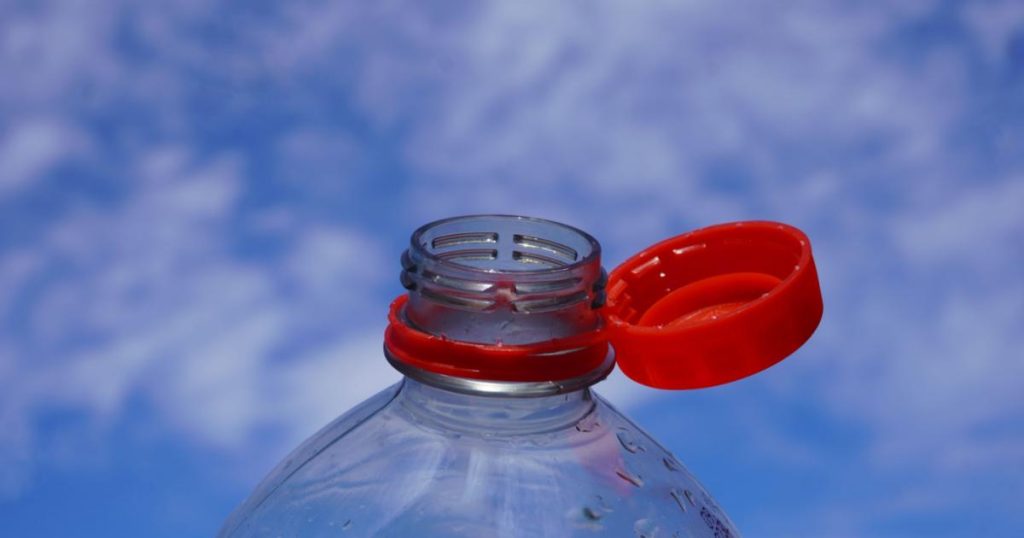Danone, Nestlé and Coca-Cola face legal pressure over plastic bottle claims
4 min read
Food and drink brands Nestlé, Danone and The Coca-Cola Hellenic Bottling Company are facing growing scrutiny over the labeling of their plastic water bottles as either “100 percent” recycled or recyclable, with several green groups having this week announced a legal complaint to the European Commission arguing such branding is “misleading.”
ClientEarth last week said it had joined several groups in raising an “external alert” to the European Commission and the Consumer Protection Cooperation Network (CPCN) against the three firms, arguing their plastic bottle claims could represent “widespread infringement of consumer protection law.”
It argues labeling plastic bottles as fully recyclable or made from 100 percent recycled content, alongside “green” imagery could amount to “greenwashing,” as it could give the impression such packaging is environmentally sustainable.
The groups are arguing that such claims fail to take account of different recycling systems in different jurisdictions, as well as the different bottle components — such as bottle tops and labels — that are harder to recycle and are therefore far more likely to be sent to landfill.
Moreover, the recycling process itself, while less harmful than other methods of waste disposal, “cannot solve the worsening crisis of plastic pollution,” the groups claim, as the plastic material cannot be recycled infinitely. Waste campaigners have long argued the focus from corporates and policymakers should be on promoting reuse and refill schemes to avoid waste in the first place, over recycling schemes.
Claims on bottles that promote this idea risk misleading consumers and presenting an obstacle to the green transition.
“A ‘100 percent’ recycling rate for bottles is technically not possible and, just because bottles are made with recycled plastic, does not mean they don’t harm people and the planet,” said ClientEarth lawyer Rosa Pritchard.
“Companies are in a unique position to change how we consume but currently these claims — which we consider to be misleading — are making it hard for consumers to make good environmental choices. Recycling is not a satisfactory solution, and companies shouldn’t be implying to consumers that plastic bottles are ever a sustainable choice.”
ClientEarth said it had joined the Environmental Coalition on Standards (ECOS) in supporting a legal complaint by the Bureau Européen des Unions de Consommateurs (BEUC) against the three firms, arguing such on-pack claims are misleading.
It explained that by filing an “external alert,” designated entities such as the BEUC are able to submit complaints to the CPCN and the EU Commission backed by evidence of business practices suspected of infringing consumer law.
It follows hot on the heels of research published last week by ClientEarth in collaboration with ECOS, consultancy Eunomia and Zero Waste Europe, which contends that many claims made by brands that their PET beverage bottles are 100 percent recyclable or recycled are likely to be misleading.
The report argues the term “recyclable” is ambiguous and should not be promoted on bottles and labels, as PET plastic is not currently a fully circular material even within the best recycling systems in Europe.
Instead, consumers should be provided with clear, on-label instructions on how to properly dispose of plastic packaging, it argued.
Increasing circularity is a complex task and a shared responsibility involving many actors along the value chain.
Pritchard described the concept of plastic bottle circularity as “a myth.” “Claims on bottles that promote this idea risk misleading consumers and presenting an obstacle to the green transition,” she said. “Consumers need access to fair, honest information about the environmental impacts of products, and clear information on recycling. Action will need to be taken on these claims to rebuild consumer confidence and better protect the planet.”
But Natural Mineral Waters Europe — which represents more than 550 bottled water brands across Europe, including Danone and Nestlé — said the industry followed “recognized, robust frameworks” with regards to recycling design and consumer guidance for PET bottles, although it also stressed that “further improvements” could still be made through forthcoming EU regulations on packaging and green claims.
“Increasing circularity is a complex task and a shared responsibility involving many actors along the value chain,” it said in a statement. “We are proud of the progress our members have made so far, and as a sector we are determined to go further. Our members will continue their efforts to provide easy-to-understand and useful information to consumers to help them make sustainable choices.”
A spokesperson for Nestlé also said: “We work hard to reduce the amount of plastic packaging we use; to lead investments and support packaging circularity alongside partners, and to communicate clearly with consumers who want to make informed choices. Nestlé has reduced its amount of virgin plastic packaging by 10.5 percent since 2018, and we are on track to get to one-third less virgin plastic by the end of 2025.”
Danone, meanwhile, did not comment directly on the legal complaint made against the three firms, but in a statement said “we strongly believe in the circularity of packaging — and will continue to invest and lead the campaign for better collection and recycling infrastructure alongside our partners.”
“We have also made real progress on our journey to reducing single use plastic and virgin plastic use in parallel,” the firm added in a statement, highlighting a 10 percent absolute reduction since 2018.



